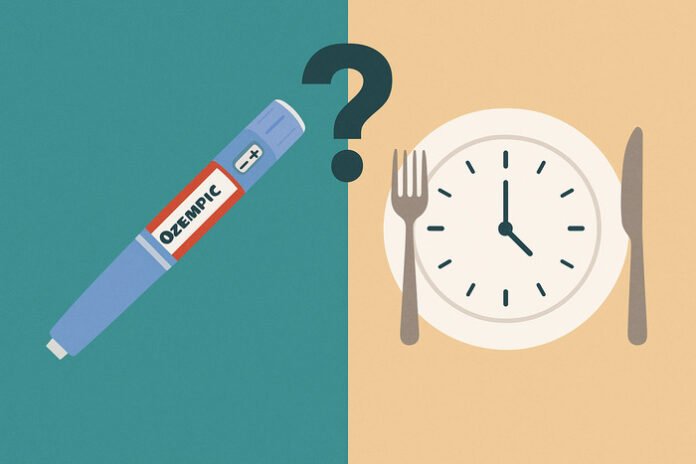In recent years, the intersection between pharmaceutical therapies and lifestyle interventions has sparked considerable interest. One such area of exploration is the potential compatibility of Ozempic (semaglutide) with intermittent fasting (IF). While Ozempic is primarily prescribed for the management of type 2 diabetes, patients and healthcare professionals alike have observed its secondary effects on weight regulation. As such, the term “Ozempic weight loss” has become increasingly associated with broader health conversations.
This blog explores what current research and expert opinion suggest about combining Ozempic with intermittent fasting. For individuals already prescribed Ozempic, understanding how dietary patterns like IF may interact with the medication is vital. For those seeking regulated access in the UK, patients can ozempicukbuy online via legally compliant, prescription-only routes.
Understanding How Ozempic Works in the Body
Ozempic is a once-weekly injection that contains semaglutide, a glucagon-like peptide-1 (GLP-1) receptor agonist. It mimics the hormone GLP-1, which is naturally released after eating and helps regulate blood sugar by:
- Stimulating insulin secretion
- Inhibiting glucagon (a hormone that increases blood sugar)
- Slowing gastric emptying
- Promoting feelings of fullness
These mechanisms not only support blood glucose control in individuals with type 2 diabetes but may also indirectly contribute to reduced calorie intake. The Ozempic pen delivers the medication in pre-measured doses and is widely used under clinical supervision.
Intermittent Fasting: An Overview
Intermittent fasting (IF) refers to dietary patterns that alternate between periods of eating and fasting. Popular methods include:
- 16:8 method: Fasting for 16 hours, eating within an 8-hour window
- 5:2 method: Eating normally for five days, then limiting intake to 500–600 calories for two days
- Alternate-day fasting: Alternating between fasting and eating days
These approaches have been shown to improve insulin sensitivity, reduce inflammation, and support metabolic flexibility. Like Ozempic, IF can also reduce appetite and support long-term weight management when implemented correctly.
Scientific Insight: Can Ozempic and Intermittent Fasting Coexist?
Although there is growing anecdotal evidence of patients combining GLP-1 medications with IF, formal clinical research on this combination is limited. However, preliminary studies and expert analyses suggest that the two strategies may be complementary rather than contradictory.
The appetite-suppressing effect of Ozempic may make it easier for some individuals to adhere to the time-restricted eating windows of intermittent fasting. Likewise, intermittent fasting may amplify the blood sugar-stabilising effects of Ozempic by reducing insulin resistance and encouraging fat metabolism.
Still, the absence of rigorous, peer-reviewed studies means that any combination should be approached cautiously and only under healthcare supervision.
Potential Benefits of Combining Ozempic with Intermittent Fasting
For those prescribed Ozempic for type 2 diabetes or other clinically evaluated purposes, intermittent fasting may provide additional metabolic support when monitored appropriately. Possible synergistic effects include:
- Enhanced appetite control: Both strategies reduce hunger, potentially reducing overeating during eating windows
- Improved insulin response: IF can lower fasting insulin levels, while Ozempic regulates insulin production in a glucose-dependent manner
- Optimised fat metabolism: IF encourages fat utilisation for energy; Ozempic reduces cravings and promotes satiety
It is important to note that while some may experience weight loss injections Ozempic as part of a medical treatment plan, this should never be pursued without a prescription and clinical justification, in accordance with UK prescribing guidelines.
Safety Considerations and Clinical Guidance
While the science suggests potential compatibility, combining intermittent fasting with Ozempic is not suitable for everyone. There are important safety aspects to consider:
- Risk of hypoglycaemia: Although rare with Ozempic alone, the risk increases if combined with other diabetic medications or extended fasting periods
- Gastrointestinal side effects: Nausea, vomiting, and constipation can be aggravated by fasting
- Energy balance: Fasting may cause dizziness or fatigue, especially when initiating Ozempic
Before making any changes to diet or medication use, individuals must consult a GP, diabetes specialist, or prescribing pharmacist. Ozempic should only be used where medically appropriate, and order Ozempic online options must always involve a regulated prescription process in the UK.
Practical Advice for Those Already Prescribed Ozempic
For patients who are already taking Ozempic and are interested in exploring intermittent fasting, here are a few practical considerations:
- Start gradually: Begin with shorter fasting windows (e.g., 12:12) before progressing to more restrictive plans
- Monitor symptoms: Track any changes in blood glucose levels, energy, or gastrointestinal side effects
- Stay hydrated: Fasting periods should not include water restriction
- Do not skip medications: Follow your prescribed dosing schedule, even during fasting
While Ozempic UK prescribing guidelines do not directly address fasting, a healthcare provider can assess whether this approach is safe for individual patients.
Accessing Ozempic in the UK: What to Know
In the UK, Ozempic is a prescription-only medicine and is regulated by the MHRA (Medicines and Healthcare products Regulatory Agency). It is not legally available over the counter for weight loss or lifestyle use. Patients prescribed Ozempic for type 2 diabetes or related conditions may wonder: where can I buy semaglutide UK legally?
Reputable online pharmacies, such as Pharmacy Planet, operate under strict NHS and UK pharmacy regulations, ensuring patients receive clinically appropriate support. Patients can order Ozempic online after completing a licensed consultation to verify medical suitability.
Final Thoughts: Compatibility with Caution
While there is no definitive research confirming or rejecting the compatibility of Ozempic with intermittent fasting, the early evidence and theoretical mechanisms suggest they could work in tandem for some individuals. However, due to potential risks—particularly related to blood sugar and digestion—it is crucial that this approach be undertaken with clinical oversight.
More research is required to establish clear guidelines and outcomes for those interested in combining medication with lifestyle interventions. Until then, any treatment strategy should prioritise safety, personalisation, and professional guidance.
Read More: The Growing Importance of Medical Bracelets in Australia’s Healthcare System
Need Access to Prescribed Treatments in the UK?
Those prescribed Ozempic as part of their ongoing medical treatment can explore secure dispensing options through registered services. For regulated consultations and access to prescribed medications, patients can explore trusted UK pharmacies such as Pharmacy Planet. As a fully licensed provider, Pharmacy Planet offers access to prescription medications through a compliant online platform, following the necessary medical protocols.



